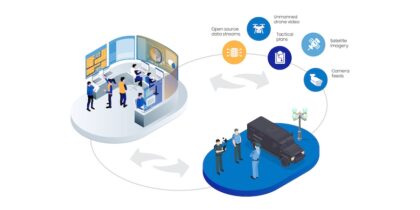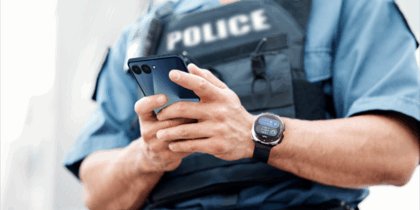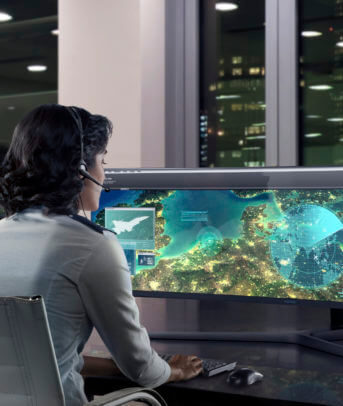There’s a new paradigm emerging in police computing, and it centers around Samsung DeX — short for desktop experience. Built into the latest Samsung smartphones, DeX lets officers extend their phone into a PC-like computing experience, whether they are in the police vehicle or back at the station.
With DeX, officers can achieve the functionality of an in-vehicle computer simply by pairing their smartphone with a touchscreen monitor and keyboard in their car. Then, when an officer leaves the vehicle to attend to a scene, they can take their smartphone with them — staying connected to the computer-aided dispatch (CAD) and other mission-essential information sources.
This level of mobility has the potential to radically improve information access for officers in the field because it shifts core computing functions to the smartphone, rather than a laptop that is bolted into the patrol car. Each officer benefits from the utility of the smartphone and maintains full access to department data, regardless of their assignment or proximity to a patrol vehicle.
Here are nine ways that DeX improves operational efficiency and empowers public safety officers:
1. Fully capable in-vehicle operations
Today’s officer relies on ready access to a computer for a variety of field operations. DeX delivers full in-vehicle computing capabilities by combining the power of a Galaxy smartphone with a dash-mounted touchscreen display and keyboard. Recent advances even allow agencies to set up an in-vehicle monitor that displays in portrait mode. The result is a flexible yet full-featured in-vehicle computing experience for officers that’s both versatile and cost-effective.
2. Access to core agency apps
With DeX, officers gain full access to CAD, records management and departmental data. Public safety software vendors are increasingly designing their products to take advantage of the move to mobile, and DeX-optimized applications can make full use of the whole display or be viewed side-by-side. Virtual desktop infrastructure (VDI) can also provide the flexibility to access Windows-based applications and systems.
Get the Samsung DeX study for public safety
Download the Public Safety Network's in-depth cost comparison on Samsung's DeX in-vehicle solution. Download Now
3. Improved ergonomics
The DeX in-vehicle setup takes up less space in the vehicle, with flexible mounting options that still offer full functionality. Less hardware intrusion into the passenger seat increases officer comfort and significantly improves safety.
4. Mobile-first approach that keeps officers connected
DeX allows officers to quickly dock and undock their smartphone and take it into the field to support evidence collection or interviews — all while maintaining full connectivity for access to department data. Geolocation services are provided at the officer level instead of the vehicle level, improving resource management and overall situational awareness.
5. No need for desktop computers at the station
DeX was originally designed to provide a full-featured desktop experience and is fully capable of supporting in-station report writing and general administrative functions. Agencies can replace existing desktop PCs with hot desks where officers can quickly dock their smartphones and get right to work. Officers can easily add smartphone pictures or videos right into reports and, using the agency’s internal network, submit those reports and move evidence onto a secure server.
6. Streamlined workflow
The sheer utility of the smartphone provides many benefits in diverse situations. The more an officer can rely on a single device to provide a variety of functions, the more proficient the officer will become at using that device to its full potential. The officer gains a more unified work experience and reduced training time, and department applications are utilized more effectively. Transitioning from the field to the station is seamless, and mobile devices provide real-time access to information that may be mission-critical in multiple operational environments.
7. Value and flexibility
Consolidating computing around a smartphone decreases total cost of ownership (TCO), thanks to lower hardware acquisition costs and cellular connectivity, as well as device management and maintenance. A case study by the Public Safety Network effectively demonstrates how agencies can achieve significant cost savings by transitioning to a mobile-centric workforce and phasing out in-vehicle computers. Major agencies like the Chicago Police Department are citing their improved efficiency and budget savings as major reasons for switching to DeX.
8. Simplified device management
Samsung DeX leverages mobile devices’ and cellular networks’ efficiencies made possible by enterprise mobility management (EMM) apps. Department-specific configurations can be deployed fleetwide, and updates can be made remotely, ensuring greater security and decreasing the downtime associated with pulling a vehicle from the field. Samsung’s Knox security is baked into the hardware of Galaxy smartphones and provides defense-level data protection. Knox Mobile Enrollment (KME) allows medium-to-large agencies to deploy large quantities of mobile devices into the field without having to enroll each one manually.
9. Expanding capabilities
Many major public safety software providers are working closely with Samsung to take full advantage of the mobile-first approach and provide first responders with mission-critical utility and functionality. This collaborative approach is popularizing the concept of a connected officer, allowing agencies to harness today’s mobile technology and build on it as new capabilities evolve.
Learn more about empowering officers in the field in this free guide to going mobile-only at your agency, or use our calculator to see how much you could save by leveraging Samsung DeX.








